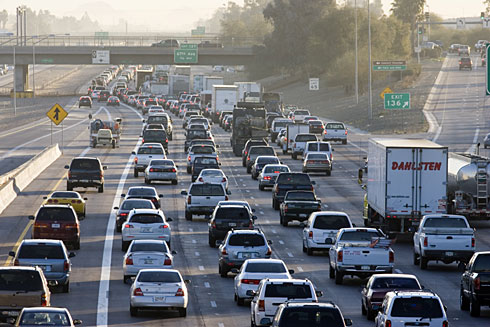Often we underestimate the power of a small change or the potential for a tight but empowered collection of individuals to effect significant change to a level far more enduring than their small numbers suggest, or for seemingly minor but well-positioned and targeted interventions to have massive impact. Look familiar?
Look familiar?
Case in point - studies of traffic congestion on German expressways have determined that a modern, real-time, and networked traffic monitoring system, that feeds information from cars on the road to each other and back to a central traffic monitoring center, can successfully and meaningfully reduce congestion, waste, and the associated societal angst that comes from incessant traffic jams with as few as five cars out of a thousand actually connected to the network, and providing traffic and road condition information back to the base.
More details from the Fast Company article that described the study:
The project consists of automobile-mounted, Wi-Fi-enabled sensors, which relay traffic data from car to car until they reach a roadside base station that sends the info to a control center, where engineers can monitor traffic jams, accidents, and construction zones and mount responses in the form of radio alerts and text messages. The surprising discovery is that even when such an automotive web is loosely knit and full of holes, connecting as little as .5 percent of cars on the road, the information it provides can help traffic managers ease congestion, potentially saving hundreds of millions of dollars in fuel costs--not to mention reducing the stress and anxiety of drivers, whether their rides are Wi-Fi-enabled or not
It seems like a simple, yet powerful mix of ingredients - a problem everyone would agree needs to be attacked, the smart application of technology and brain power to address the issue, and a solution flexible enough to realize that it won't be feasible or practical to get even a majority of drivers on-board to successfully implement, much less every driver. To me, that is the key to the story - the potential to effect change and likely significant improvement for all the actors involved, (drivers, businesses, families, the environment), while only recruiting so-to-speak a tiny minority of the players that in theory are engaged and passionate about the problem to be solved.
Other potential lessons to take from the 'Five out of a Thousand' story? How about to reinforce the idea that in any complex, multi-player system consisting of a collection of individual motivations, attitudes, capabilities, and desires that effecting change or even incremental improvements might not always require a kind of universal buy-in and commitment in order to succeed. I think sometimes we can get caught up in making sure that every new system or process improvement reaches all the far corners of the extended enterprise or ecosystem, and can often spend enormous time and energy 'selling' to a portion of our constituents that are never going to come on board, and quite possibly won't even impact the overall success or failure of the initiative all that much either way. Perhaps you can think about using the precepts of Social Network Analysis inside the organization to better focus change initiatives and more quickly determine the right 0.5% for your efforts to target?
Admittedly most organizational or societal transformation projects will need more than 0.5% participation to be connected and engaged, but certainly 100% participation is usually not needed (or even possible).
The trick is of course, finding the right 'Five out of a Thousand' that will make your project or passion come to life. It's too bad people are more complex and harder to read than cars on the expressway.
Aren't they?